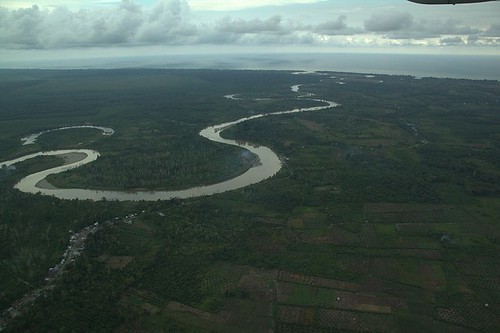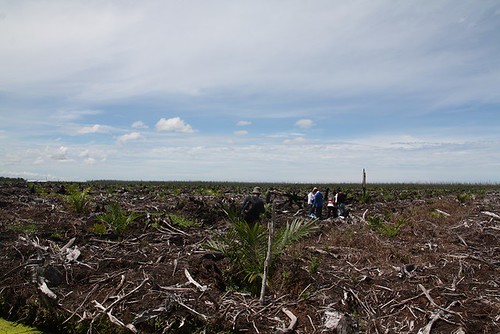
รูป 5-1 สองฟากแม่น้ำพรุตรีป้าเต็มไปด้วยสวนปาล์มน้ำมัน / ถ่ายเมื่อวันที่ 3 เดือนสิงหาคม 2012 โดย Yusriadi, Walhi Aceh

รูป 5-2 ทีมวิจัยจาก Bogor Agricultural Institution ลงพื้นที่สวนปาล์มของบริษัทคาลิตาอาลัม เพื่อเก็บข้อมูลวิจัย
/ ถ่ายเมื่อวันที่ 5 เดือนพฤษภาคม 2012 โดย Yusriadi, Walhi Aceh
ท่ามกลางการขยายพื้นที่ปลูกปาล์มน้ำมันในเอเชียตะวันออกเฉียงใต้ดำเนินไปอย่างรวดเร็ว ความขัดแย้งอย่างรุนแรงก็ขยายลามไปทั่ว ทั้งระหว่างชาวบ้านในชุมชนพื้นที่ปลูกปาล์มน้ำมันกับบริษัทผู้ประกอบการ ตั้งแต่กลุ่มทุนท้องถิ่น กลุ่มทุนระดับชาติ ไปจนถึงกลุ่มทุนข้ามชาติ
อันนำมาสู่ความขัดแย้ง ระหว่างชาวบ้านในชุมชนกับรัฐผู้อนุญาตให้เอกชนเข้าไปปลูกปาล์มน้ำมัน และในบางกรณีก็พัฒนาไปเป็นความขัดแย้งระหว่างรัฐกับกลุ่มทุนผู้ได้รับอนุญาตให้เข้าไปใช้พื้นที่
คดีที่นำมาบอกเล่าต่อไปนี้คือตัวอย่างความขัดแย้งที่อาเจะห์ ซึ่งตั้งอยู่ตรงอาณาบริเวณเกาะสุมาตราเหนือ ประเทศอินโดนีเซีย อันเป็นพื้นที่เป้าหมายของกลุ่มทุนตั้งแต่ระดับท้องถิ่น ไปจนถึงระดับชาติ และระดับข้ามชาติ ต่างมุ่งหน้าเข้าไปบุกเบิกป่า เพื่อเปิดหน้าดินปลูกปาล์มน้ำมัน
คดีนี้กระทรวงสิ่งแวดล้อมเป็นโจทย์ฟ้องเรียกค่าเสียหายจากบริษัทคาลิสตาอาลัม (PT Kalista Alam (PT=Perseroan Terbatas หมายถึงบริษัท)) ต่อศาลเมอลาโบห์ (Meulaboh) เมื่อวันที่ 8 พฤศจิกายน 2555 กล่าวหาบริษัทคาลิสตาอาลัม ลักลอบวางเพลิงก่อความเสียหายต่อสิ่งแวดล้อมในป่าพรุตรีป้า หมายเลขคดี No.12/pdt.G/2012/PN–MBO
ศาลเมอลาโบห์นัดพิจารณาคดีนี้ครั้งแรก เมื่อวันที่ 27 พฤศจิกายน 2555 แต่ฝ่ายจำเลยไม่มา ศาลจึงเลื่อนการพิจารณาคดีไปเป็นวันที่ 12 ธันวาคม 2555
หลังจาก Firman Hidayat ผู้สื่อข่าวสิ่งแวดล้อมจาก The Globe Journal ซึ่งติดตามปัญหาป่าพรุตรีป้ามาตั้งแต่ต้น กับ Muhammad Nizar Abdurrani ผู้ช่วยผู้อำนวยการวาลฮี อาเจะห์ สรุปความเป็นมาเกี่ยวกับคดีพอเข้าใจในระดับหนึ่ง
ฉันจึงถือโอกาสขอติดตาม Firman Hidayat ไปฟังการพิจารณาคดีนี้ที่ศาลเมอลาโบห์ด้วย
ค่ำคืนของวันที่ 10 ธันวาคม 2555 ฉันออกเดินทางจากบันดาอาเจะห์ เพื่อตาม Firman Hidayat ซึ่งเดินทางล่วงหน้าไปก่อนแล้ว ด้วยรถโดยสารประจำทางที่เคลื่อนตัวไปยังจุดหมายด้วยความเร็วอันจำกัด ไปตามเส้นทางที่อยู่ในสภาพใกล้เคียงกับถนนของกรมทางหลวงชนบทในประเทศไทย กว่าเราจะเดินทางถึงเมอลาโบห์ จึงใกล้สว่างเต็มที
เนื่องจากใช้เวลาในการเดินทางมาเกือบทั้งคืน ตลอดวันที่ 11 ธันวาคม 2555 ฉันจึงใช้เกือบทั้งหมดไปกับการพักผ่อน ก่อนจะไปสมทบกับคณะเจ้าหน้าที่องค์กรพัฒนาเอกชนด้านสิ่งแวดล้อม ที่เดินทางล่วงหน้ามาจากบันดาอาเจะห์ก่อนแล้ว
วันที่ 12 ธันวาคม 2555 ซึ่งเป็นวันที่ศาลเมอลาโบห์นัดพิจารณาคดีกระทรวงสิ่งแวดล้อมฟ้องเรียกค่าเสียหายจากบริษัทคาลิสตาอาลัม ทำลายป่าพรุตรีป้าครั้งที่ 2 เราออกจากที่พักไปยังศาลเมอลาโบห์ตั้งแต่เช้า
ศาลเมอลาโบห์ ตั้งอยู่ที่อำเภออาเจะห์บารัต เป็นทั้งที่ทำการศาลแพ่งและศาลอาญา บรรยากาศภายในบริเวณศาลไม่เคร่งเครียด แต่เพื่อความปลอดภัยชาวต่างชาติที่สนใจเข้าร่วมฟังพิจารณาคดีอย่างฉัน ก็ต้องระมัดระวังตัวพอสมควร
การพิจารณาคดีคราวนี้ จำเลยมาสายทำให้การพิจารณาคดีล่าช้าไปประมาณ 15 นาที
บรรยากาศภายในศาลเมอลาโบห์อยู่ในสภาพคึกคัก ด้วยบรรดานักข่าว นักวิจัยต่างชาติ และนักพัฒนาเอกชนด้านสิ่งแวดล้อม ต่างให้ความสนใจคดีนี้อย่างเป็นพิเศษ เดินทางไปร่วมรับฟังการพิจารณาคดีกันมากหน้าหลายตา
เนื่องเพราะกระบวนการพิจารณาคดีไม่เข้มงวดเท่าไหร่นัก ทุกคนจึงสามารถเข้าร่วมรับฟังการพิจารณาคดีได้ทั่วหน้า
ขณะกำลังพิจารณาคดี ประตูศาลก็ยังเปิดอยู่ ผู้คนที่เดินผ่านไปมา ต่างชักชวนกันหยุดยืนฟังการพิจารณาคดีตรงบริเวณนั้น
ด้านหลังเก้าอี้ที่นั่งสำหรับผู้เข้าฟังพิจารณาคดี มีโต๊ะปิงปองตั้งอยู่ ยิ่งทำให้บรรยากาศในศาลผ่อนคลาย รู้สึกสบายๆ เหมือนนั่งอยู่ในบ้านพักรับรอง
การพิจารณาคดีใช้เวลาเพียงสั้นๆ หลังจาก Rebecca Imelda ตัวแทนทีมทนายความ แจ้งต่อศาลว่าได้รับการแต่งตั้งให้เป็นทนายความของบริษัทคาลิสตาอาลัม แต่ยังไม่มีหนังสือแต่งตั้งจากบริษัท
ผู้พิพากษา Rahmawati SH – (SH นักกฎหมาย) จึงเลื่อนการพิจารณาคดีนี้ออกไปเป็นวันที่ 7 มกราคม 2556
Rebecca Imelda บอกกับผู้สื่อข่าว The Globe Journal ว่า เพิ่งได้รับมอบหมายจากบริษัทคาลิสตาอาลัม ให้รับผิดชอบดูแลคดีนี้ สาเหตุที่ยังไม่ได้รับการแต่งตั้งให้เป็นทนายความคดีดังกล่าว เพราะบริษัทฯ อยู่ระหว่างศึกษาข้อมูลเพื่อเตรียมตัวต่อสู้คดี
ขณะที่อัยการเจ้าของคดี Syafruddin SH บอกกับเราว่า ถ้าจำเลยคือบริษัทคาลิสตาอาลัม ยังบ่ายเบี่ยงไม่ยอมเข้าสู่กระบวนการพิจารณาคดีของศาล ศาลก็จะตัดสินให้โจทก์คือกระทรวงสิ่งแวดล้อมชนะคดี แต่ทางบริษัทคาลิสตาอาลัม ก็ยังคงมีสิทธิยื่นอุทธรณ์ต่อศาลอุทธรณ์ได้
อันเป็นไปตามกระบวนการพิจารณาคดี ซึ่งไม่แตกต่างไปจากขั้นตอนการพิจารณาคดีของศาลไทย
เนื่องเพราะการพิจารณาคดีเสร็จสิ้นลงอย่างรวดเร็ว เราจึงมีเวลาเหลือพอที่จะอ้อยอิ่งได้อีกเล็กน้อย ประกอบกับบรรยากาศสบายๆ ระหว่างการพิจารณาในศาลเมอลาโบห์ทำให้ฉันอยากจะไปฟังการพิจารณาคดีของศาลชารีอะห์ ศาลศาสนาอิสลาม ที่กำลังพิจารณาคดีอยู่อีกอำเภอหนึ่ง ซึ่งต้องใช้เวลาเดินทางร่วม 2 ชั่วโมง
ทว่าในที่สุด ฉันก็ต้องเลิกล้มความต้องการ เพราะมีใครบางคนในคณะที่มาด้วยกัน ต้องรีบกลับไปร่วมงานแต่งงานญาติ
รถคันที่เรานั่งอยู่ จึงมุ่งหน้ากลับไปยังเมืองบันดาอาเจะห์ ถนนสายที่รถกำลังวิ่งอยู่นี้ เป็นถนนที่สร้างขึ้นมาใหม่หลังจากที่อาเจะห์โดนคลื่นยักษ์สึนามิถล่มตอนปลายปี2547 เลาะเลียบไปตามชายฝั่งทะเลตะวันตกของจังหวัดอาเจะห์ ผ่านอำเภออาเจะห์บารัต (Aceh Barat) อำเภออาเจะห์จายา (Aceh Jaya) อำเภออาเจะห์เบอซาร์ (Aceh Besar) และเมืองหลวงบันดาอาเจะห์ (Banda Aceh) ระยะทางประมาณ 180 กิโลเมตร หากนั่งรถโดยสารสาธารณะใช้เวลาเดินทางประมาณ 5 ชั่วโมง
เนื่องด้วยงบประมาณการสร้างถนนเป็นของ USAID: United States Agency for International Development หรือสำนักงานเพื่อการพัฒนาระหว่างประเทศของสหรัฐอเมริกา ที่คนไทยเรียกด้วยความคุ้นเคยว่า “ยูเสด” ชาวบ้านเลยเรียกถนนสายนี้ว่า “ถนนยูเสด” บางช่วงกำลังขยาย บางช่วงกำลังซ่อมแซม
สองข้างทางปรากฏภาพปาล์มน้ำมันยืนต้นเรียงรายอยู่เป็นระยะ มีร่องร่อยของปาล์มน้ำมันทั้งที่ปลูกมานานหลายปีและเพิ่งปลูกใหม่ๆ ตลอดรายทางเห็นต้นไม้ยืนตายอยู่ไกลๆ
ถนนเส้นนี้ ตัดผ่านทั้งป่าพรุ เทือกเขา และที่ราบ เมื่อผ่านบริเวณป่าพรุก็เห็นสวนปาล์ม ผ่านบริเวณภูเขาก็เป็นป่า พอบริเวณที่ราบก็จะพบชุมชน เห็นการทำนาทำสวนของชาวบ้าน สะท้อนภาพวิถีชีวิตของคนพื้นถิ่นอาเจะห์ชัดเจน
ฉันกลับมาติดตามความคืบหน้าคดีกระทรวงสิ่งแวดล้อมฟ้องเรียกค่าเสียจากบริษัทคาลิสตาอาลัม คดีเผาและทำลายสิ่งแวดล้อมป่าพรุตรีป้า ผ่านเว็บไซต์ The Globe Journal ซึ่งข่าวจากเว็บไซต์แห่งนี้รายงานว่า เมื่อวันที่ 7 มกราคม 2556 ซึ่งศาลนัดพิจารณาคดีนี้เป็นนัดที่ 3 การพิจารณาคดีต้องเลื่อนออกไปอีก เพราะทนายความของบริษัทคาลิสตาอาลัม ไม่สามารถแสดงเอกสารยืนยันต่อศาลว่าได้รับการแต่งตั้งจากบริษัทฯ ให้เป็นทนายความคดีนี้ และเอกสารมอบอำนาจให้ทนายความดำเนินการแทนบริษัทฯ ก็หมดอายุมาตั้งแต่วันที่ 31 ธันวาคม 2555 ศาลจึงเลื่อนการพิจารณาคดีนี้ออกไปเป็นวันที่ 16 มกราคม 2556 เพื่อให้ทั้ง 2 ฝ่ายเจรจาไกล่เกลี่ยค่าเสียหาย
ต่อมา วันที่ 30 มกราคม 2556 เปิดฉากการเจรจาครั้งแรก ตัวเลขความเสียหายที่กระทรวงสิ่งแวดล้อมเรียกจากบริษัท คาลิสตาอาลัมอยู่ที่ประมาณ 3 แสนล้านรูเปีย ผลการเจรจาไม่สามารถตกลงกันได้
อีกคดีที่ฉันสนใจเป็นพิเศษคือ คดีบริษัทคาลิสตาอาลัม ฟ้องต่อศาลอาเจะห์ กล่าวหาผู้ว่าอาเจะห์ยกเลิกใบอนุญาตสัมปทานที่ดินเพื่อปลูกพืชเศรษฐกิจในป่าพรุตรีป้าโดยมิชอบ หมายเลขคดี No.18/G/2012/PTUN–BNA
Muhammad Nizar Abdurrani สรุปที่มาของคดีนี้ให้ฟังว่า สมัย Irawandi Yusuf เป็นผู้ว่าอาเจะห์ ได้ออกใบอนุญาตสัมปทานที่ดินเพื่อปลูกพืชเศรษฐกิจในป่าพรุตรีป้าให้กับบริษัทคาลิสตาอาลัม ลงวันที่ 25 สิงหาคม 2554 หมายเลขใบอนุญาต No.525/BP2T/5322/2011 ซึ่งเป็นใบอนุญาตที่ออกให้บริษัทคาลิสตาอาลัม เข้าไปบุกเบิกปลูกปาล์มน้ำมันในพื้นที่ป่าพรุที่มีความลึก 3 เมตร ประเด็นก็คือ กฎหมายของอินโดนีเซียกำหนดให้บริเวณป่าพรุที่มีความลึก 3 เมตร เป็นป่าคุ้มครอง
วาลฮีอาเจะห์ (WALHI Aceh) ซึ่งเป็นองค์กรพัฒนาเอกชนด้านสิ่งแวดล้อม จึงยื่นฟ้องผู้ว่าอาเจะห์ต่อศาลปกครองอาเจะห์ เมื่อวันที่ 23 พฤศจิกายน 2554
ต่อมา วันที่ 3 เมษายน 2555 ศาลปกครองอาเจะห์ ตัดสินให้วาลฮีอาเจะห์แพ้คดี
วาลฮีอาเจะห์ ยื่นอุทธรณ์ต่อศาลปกครองเมดาน หมายเลขคดี No.89/B/2012/PTTUN–MDN ศาลอ่านคำพิพากษา เมื่อวันที่ 30 สิงหาคม 2555 ให้วาลฮีอาเจะห์ชนะคดีนั้น ต่อมา บริษัทคาลิสตาอาลัม ยื่นอุทธรณ์ต่อศาลปกครองสูงสุดจาการ์ต้า และยังอยู่ในขั้นตอนการพิจารณา
Zaini Abdullah ผู้ว่าอาเจะห์คนปัจจุบัน ซึ่งขณะนั้นเพิ่งชนะการเลือกตั้งขึ้นดำรงตำแหน่งเมื่อเดือนเมษายน 2555 จึงมีคำสั่งเพิกถอนใบอนุญาตที่ออกให้บริษัทคาลิสตาอาลัม ตามคำสั่งหมายเลข No.525/BP2T/5078/2012 ลงวันที่ 27 กันยายน 2555
เป็นเหตุให้บริษัทคาลิสตาอาลัม ฟ้องกลับ ผู้ว่าอาเจะห์ ที่เพิกถอนใบอนุญาตสัมปทานที่ดินเพื่อปลูกพืชเศรษฐกิจโดยมิชอบ ต่อศาลปกครองบันดาอาเจะห์
ศาลปกครองบันดาอาเจะห์ นัดพิจารณาคดีเมื่อวันที่ 13 ธันวาคม 2555 ในการพิจารณาคดีครั้งแรก ที่บริเวณหน้าศาลมีกลุ่มนักศึกษาประมาณ 50 คน ออกมาประท้วงบริษัทคาลิสตาอาลัม
กลุ่มนักศึกษาอ้างว่า การฟ้องผู้ว่าอาเจะห์ของบริษัทคาลิสตาอาลัม เป็นการขัดขวางไม่ให้ผู้ว่าอาเจะห์ปกป้องป่าพรุตรีป้า กลุ่มนักศึกษาชูป้ายประท้วง พร้อมปราศรัยผ่านโทรโข่ง เปิดโปงความเสียหายที่เกิดกับป่าพรุตรีป้า รณรงค์ให้ชาวอาเจะห์ร่วมกันอนุรักษ์ป่าพรุแห่งนี้ และเรียกร้องให้ศาลพิจารณาคดีนี้อย่างรอบคอบ
กำลังตำรวจ พร้อมรถขนย้ายผู้ต้องขังจอดรออยู่หน้าศาล เตรียมพร้อมรับมือความรุนแรงที่อาจจะเกิดขึ้น
ทว่า กลุ่มนักศึกษาที่กำลังแจกจ่ายใบปลิวและปราศรัยผ่านโทรโข่งตรงบริเวณหน้าศาลในวันนั้น กลับไม่มีท่าทีก้าวร้าวรุนแรง บริเวณร้านค้าใกล้ศาล มีใบปลิวของกลุ่มนักศึกษาที่มาประท้วงวางให้ผู้คนหยิบฉวยขึ้นมาอ่านจำนวนหนึ่ง ข้อความในใบปลิวระบุสาเหตุที่ออกมาประท้วงว่า
“การยกเลิกใบอนุญาตที่เคยออกให้บริษัทคาลิสตาอาลัมนั้น ทำให้เห็นว่ารัฐบาลสนใจปกป้องป่าพรุตรีป้า แต่ทางบริษัทคาลิสตาอาลัม มีปฏิกิริยาต่อต้านผู้ว่าฯ ที่มีท่าทีปกป้องป่าพรุแห่งนี้ พวกเรานักศึกษาและกลุ่มปกป้องป่าพรุตรีป้าจึงต้องออกมาประท้วง”
ในใบปลิวยังมีข้อความเรียกร้องให้ผู้พิพากษาตัดสินคดีนี้ ด้วยความระมัดระวัง เพราะบริษัทยังคงความเคลื่อนไหวอยู่ในพื้นที่ที่เคยได้รับอนุญาตให้ใช้ที่ดินจำนวน 1,605 เฮกตาร์
ในที่สุด เมื่อวันที่ 2 พฤษภาคม 2556 ศาลปกครองอาเจะห์ก็ตัดสินให้บริษัทคาลิสตาอาลัมชนะคดี แต่ผู้ว่าอาเจะห์ขอยื่นอุทธรณ์ต่อศาลปกครองเมดาน ซึ่งขณะนี้อยู่ระหว่างการเตรียมเอกสาร
ฉันรับรู้เรื่องราวที่หน่วยงานของรัฐในประเทศอินโดนีเซีย ออกมาฟ้องร้องกลุ่มทุนแล้ว อดนึกถึงยุทธการชาวบ้านบุกยึดสวนปาล์มน้ำมันของกลุ่มทุนในประเทศและกลุ่มทุนข้ามชาติ ที่จังหวัดสุราษฎร์ธานี และจังหวัดกระบี่แล้วใจหาย ด้วยเพราะดูเหมือนจะมีเพียงแค่ 2 คดี ที่รัฐออกมาดำเนินการกับกลุ่มทุนที่บุกรุกป่าปลูกปาล์มน้ำมัน ที่จังหวัดสุราษฎร์ธานี
นั่นคือ คดีสำนักงานปฏิรูปที่ดินเพื่อการเกษตรฟ้องบริษัทจิวกังจุ้ยพัฒนา จำกัด จากมาเลเซีย บุกรุกที่ดิน สปก. นำไปปลูกปาล์มน้ำมัน ซึ่งศาลชั้นต้นและศาลอุทธรณ์ตัดสินให้สำนักงานปฏิรูปที่ดินเพื่อการเกษตรชนะคดี ขณะนี้อยู่ระหว่างการพิจารณาของศาลฎีกา
อีกคดีเป็นคดีที่สำนักงานปฏิรูปที่ดินเพื่อการเกษตร แจ้งความดำเนินคดีบริษัทสหอุตสาหกรรมน้ำมันปาล์ม จำกัด (มหาชน) รุกที่ดิน สปก. ต่อมาทางบริษัทฯ ยอมคืนที่ดินให้กับสำนักงานปฏิรูปที่ดินเพื่อการเกษตร
ขณะที่ที่ดินของรัฐใน 2 จังหวัดนี้ จำนวนมากมายมหาศาลที่ถูกกลุ่มทุนเข้าไปใช้ประโยชน์โดยมิชอบ ไม่ว่าจะเป็นกรณีหมดอายุการเช่าที่ดินจากรัฐไปแล้ว แต่ยังคงเก็บเกี่ยวผลผลิตไม่ยอมคืนที่ดินให้รัฐ หรือบุกรุกที่ดินของรัฐเกินจากพื้นที่ที่รัฐให้เช่า หรือบุกรุกเข้าไปใช้ประโยชน์ในที่ดินของรัฐโดยมิชอบ ฯลฯ
นี่ยังไม่นับรวมที่ดินป่าพรุและพื้นที่ชุ่มน้ำในลุ่มน้ำทะเลสาบสงขลา ที่ถูกบุกรุกอย่างหนัก กระทั่งเกิดปรากฏการณ์เผาป่าพรุควนเคร็งให้เห็นกันครั้งแล้วครั้งเล่า ที่จนบัดนี้รัฐก็ยังไม่สามารถจัดการใดๆ ได้เลย
นี่คือความแตกต่างระหว่างประเทศไทยกับประเทศอินโดนีเซีย ที่ฉันประสบด้วยตัวเอง
หมายเหตุ: “ความเห็นของผู้เขียนมิได้สะท้อนความเห็นของโครงการปัญญาชนสาธารณะแห่งเอเชีย มูลนิธิฯ สถาบันประสานงานกลาง และ/หรือสถาบันภาคี”
**************************************************************************************************
Palm plantations and forest: From Indonesia to Thailand
Ruayrin pedsalabkaew
The rapid expansion of oil palm plantation in Southeast Asia has given rise to more violent conflicts between local people in the area of concession and the entrepreneurs including local, national and multinational capitalists.
It has also led to conflicts between local people and the state that has given permission the private sector to carry out the oil palm plantation. It has escalated to disputes between the state and the investors who have been awarded the concessions in some areas.
The case to be explained is an example of dispute in Aceh located in North Sumatra, Indonesia. It is a hub of oil palm plantation by local, national and multinational investors.
In this case, the Ministry of the Environment sues for damage claim from PT. Kalista Alam (PT Kalista Alam (PT=Perseroan Terbatas means “company”) with the Meulaboh Court on 8 November 2012 accusing PT. Kalista Alam of illegally setting fire and causing damage to the environment in the Tripa Peat Swamp Forest, as per the case no.12/pdt.G/2012/PN–MBO.
The first hearing of the case took place on 27 November 2012, but the defendants have failed to turn up. Thus, the trial was postponed to 12 December 2012.
After getting briefing of the case from Firman Hidayat, an environmental reporter from The Globe Journal who has bee monitoring issues in the Tripa Peat Swamp Forest since the beginning and Muhammad Nizar Abdurrani, Deputy Direction of Walhi Aceh, I decided to accompany Firman Hidayat to attend the court hearing in the Meulaboh Court.
During the night of 10 December 2012, I departed from Banda Aceh to catch up with Firman Hidayat who had already traveled there. My bus traveled to the destination with limited speed. The road system there is on par with rural road system in Thailand. I arrived in Meulaboh almost at dawn.
As it took me the whole night to ride on the bus, I decided to rest during 11 December 2012, then to join the group activists who had come from Banda Aceh before me.
On 12 December 2012, the second hearing on the case in which the Ministry of the Environment sues PT. Kalista Alam for destroying Tripa Peat Swamp Forest took place. We came out from our place to the Court in the early morning.
The Meulaboh court complex is located in Aceh Barat and houses both the Civil Court and Criminal Court. The atmosphere in the court was relaxing, but caution was applied to ensure security as foreigners including me attended the hearing that day.
As the defendants arrived fifteen minutes late, so did the commencement of the trial.
The atmosphere in the Meulaboh Court was quite active teemed with a team of reporters, foreign researchers and environmental activists who have paid special attention to the case.
As the court procedure was not so strict, everyone was allowed to attend the trial.
During the trial, the court gates were still open, and people were walking about. Some passersby stopped just to hear the trial.
Behind seat rows where the trial attendees were seated, there was a ping pong table. It even made the atmosphere informal and casual, as if one was sitting in a guest room.
The hearing lasted not long. It was ended after Rebecca Imelda, an attorney, informed the Court that she was appointed to defend PT. Kalista Alam, though the official appointment paper from her company has not yet arrived.
Judge Rahmawati SH – (SH = lawyer) decided to postpone the case to 7 January 2013.
Rebecca Imelda told The Globe Journal’s reporter that she was just asked by PT. Kalista Alam to take care of the case. The official appointment was not done since the company was too busy looking for information to prepare for the defence.
Meanwhile, Syafruddin SH, the prosecutor, told us that if the defendant, PT. Kalista Alam, continued to buy time, the Court might rule that the Ministry of the Environment wins the case, though it was eligible for PT. Kalista Alam to appeal the case.
The court procedure seems to differ from the court in Thailand, though.
As the hearing ended so quickly, we had some time left to explore the place. The relaxing atmosphere during the trial at the Meulaboh Court made me feel tempted to attend a hearing by the Sharia Court, the religions court, which was conducting a trial in another district two hours away from where I was.
Alas, I had to cancel the plan as someone in our entourage had to rush back to attend a wedding of relatives.
A car took us back to Banda Aceh on a newly paved road, rebuilt after Tsunami in late 2004. It treads along the Western coast of Aceh through Aceh Barat, Aceh Jaya, Aceh Besar and Banda Aceh, about 180 kilometers. It takes five hours to cover the length on public buses.
The road has been made possible by funding from USAID or the United States Agency for International Development. As a result, the road is called “USAID” by local people. Part of it is being expanded, the others were being repaired.
Flanked by palm trees, the road gives you view of both newly planted and formerly planted palm trees. Some are dead, though.
The road cuts through peat swamp forests, mountain ranges and plain areas. Through peat swamp forests, one can see oil palm plantations. The mountains are still covered by forests, though. Communities are found on low-lying areas. Paddy farming and orchards are a unique aspect of life in Aceh.
After that, I monitored progress of the litigation by the Ministry of the Environment against PT. Kalista Alam for burning and destroying the environment of Tripa Peat Swamp Forest from website of The Globe Journal. It was reported by the website the 7 January 2013 hearing, the third in the case, has also been postponsed by the Court as PT. Kalista Alam’s attorneys failed to establish the Court the document appointing her as the company’s legal representative and the power of attorney expired since 31 December 2012. Thus, it was put off to 16 January 2013, when both parties agreed to negotiate to resettle the case.
Then, on 30 January 2013, during the first negotiation, the Ministry of the Environment asked for 300 billions rupiahs from the company, and no agreement has been reached.
Another case that interested me was filed by PT. Kalista Alam with the Aceh Court accusing the Governor of Aceh for abusing his power in revoking permission to carry out plantation of economic crops in the Tripa Peat Swamp Forest. The case was accepted by the Court as the case no.18/G/2012/PTUN–BNA.
According to a briefing by Muhammad Nizar Abdurrani, when Irawandi Yusuf was Aceh Governor, he issued permission to carry out plantation of economic crops in the Tripa Peat Swamp Forest to PT. Kalista Alam, dated 25 August 2011. The license no. 525/BP2T/5322/2011 allowed that company to implement oil palm plantation in peat swamp forest which was three meters deep. But according to the Indonesias regulations, peat swamp forests at three meters deep are classified as protected forests.
WALHI Aceh, an environmental NGO, filed a case against the Aceh Governor with the Aceh Administrative Court on 23 November 2011.
On 3 April 2012, the Aceh Administrative Court dismissed the case.
WALHI Aceh appealed with the Medan Administrative Court as per the case No.89/B/2012/PTTUN–MDN. The verdict was delivered on 30 August 2012 as WALHI Aceh won the case. Later, PT. Kalista Alam appealed with the Jakarta Supreme Court and the trial is ongoing.
Zaini Abdullah, the incumbent Aceh Governo, was just winning his election and ascending to power in April 2012. He decided to revoke the licenses given to PT. Kalista Alam as per the order no. 525/BP2T/5078/2012 dated 27 September 2012.
That prompted PT. Kalista Alam to file a case against the Aceh Governor for revoking the permission with the Banda Aceh Administrative Court.
The Banda Aceh Administrative Court held the first hearing on 13 December 2012 with about 50 students protesting against PT. Kalista Alam being gathered in front of the court building.
The students claimed that the case filed against Aceh Governor by PT. Kalista Alam was an attempt to prevent him from protecting Tripa Peat Swamp Forest. They were holding placards and banners and making speeches through megaphones exposing damage done on Tripa Peat Swamp Forest. They asked the Aceh people to help protect the peat swamp forest and urged the Court to hear the case carefully.
Police forces and trucks for holding offenders were deployed in front of the Court to prepare for any violence.
The students distributed fliers and made speeches through megaphones in front of the Court and no violence gesture was made. At shop stalls right by the Court, leaflets were left for people to pick up and read. Part of them explained the reasons of protest that;
“The revocation of permissions issued to PT. Kalista Alam indicates how interested the government is to protect Tripa Peat Swamp Forest. But the company got back at the Governor who wanted to protect the peat swamp forest. We the students and groups protecting Tripa Peat Swamp Forest have to come out and protest.”
The leaflets also implored the Judges to use their utmost prudence in hearing the case as the company’s implementation was still active in the area of 1,605 hectares for which the licenses had been given.
Eventually on 2 May 2013, the Aceh Administrative Court ruled that PT. Kalista Alam won the case. Meanwhile, the Aceh Governor appealed with the Medan Administrative Court, and material evidence was being prepared.
Hearing about the lawsuit filed by a state agency in Indonesia against private investors reminds me of the operation of local villagers who raided and occupied oil palm plantations belonging to both national and multinational investors in the provinces of Surat Thani and Krabi, the case of which shocked me. There seem to be just two cares whereby the authorities have come out to litigate against the oil palm industry that had encroached on forests in Surat Thani.
They were the case filed by the Office of Land Reform for Agriculture against Jew Kung Jui Development Co. from Malaysia for encroaching and planting oil palms on land classified for land reform. Both the Lower Court and the Appeals Court ruled that the Office of Land Reform won the case. It is still pending in the Supreme Court, though.
Another case is filed by the Office of Land Reform for Agriculture against United Palm Oil Industry PLC for encroaching on land classified for land reform. Later the company decided to return the land to the Office of Land Reform.
Meanwhile, a vast tract of land in both provinces has been illegally exploited by investors. Some continue to harvest produce on the land whose leases have already expired and they refused to return the land to the state. Some planted oil palm in area more than what is provided by the state. Some even encroached and illegally planted palm trees there.
This is to mention peat swamp forests and wetland in the Songkhla Lake which have been subjected to excessive encroachment. The Kruan Kreng peat swamp forest has been ravaged by man made fires time and again, yet the government has failed to take action.
This is one of the differences between Thailand and Indonesia from my own experience.
“The views of the author do not reflect those of the API Fellowships Program, The Nippon Foundation, the Coordinating Institution, and/or the Partner Institutions”

